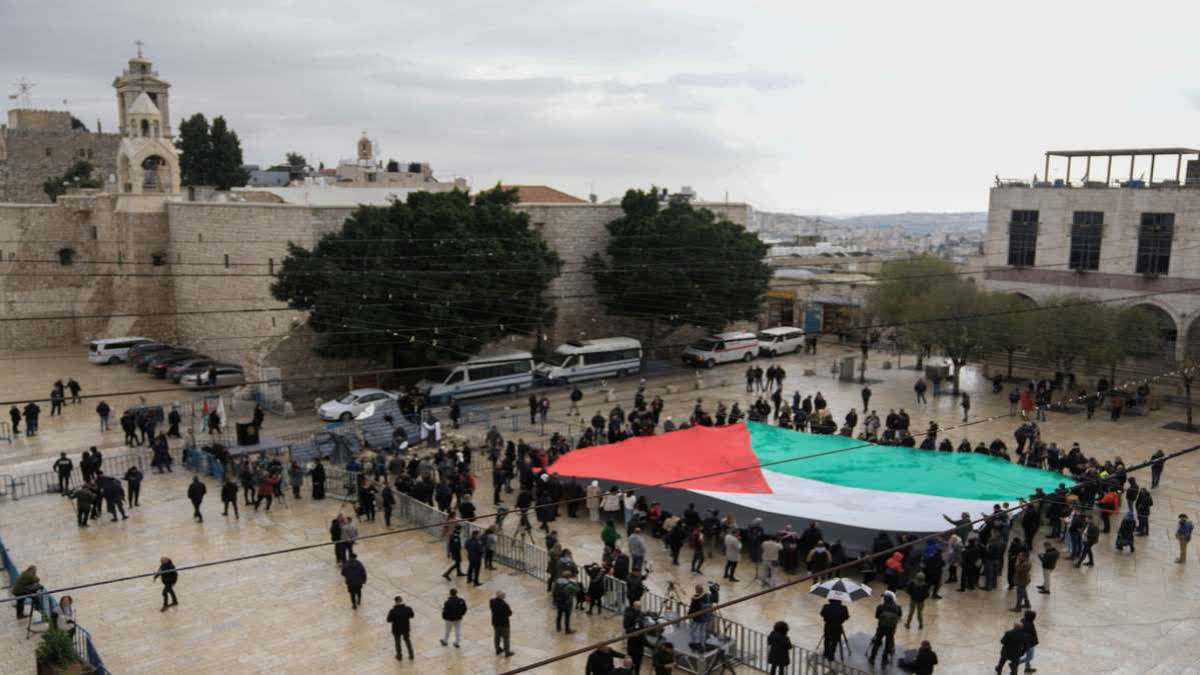Bethlehem (West Bank):The typically bustling biblical birthplace of Jesus resembled a ghost town Sunday after Christmas Eve celebrations in Bethlehem were called off due to the Israel-Hamas war.
The festive lights and Christmas tree that normally decorate Manger Square were missing, as were the throngs of foreign tourists and jubilant youth marching bands that gather in the West Bank town each year to mark the holiday. Dozens of Palestinian security forces patrolled the empty square. “This year, without the Christmas tree and without lights, there’s just darkness,” said Brother John Vinh, a Franciscan monk from Vietnam who has lived in Jerusalem for six years.
Vinh said he always comes to Bethlehem to mark Christmas, but this year was especially sobering. He gazed at a nativity scene in Manger Square with a baby Jesus wrapped in a white shroud, reminiscent of the thousands of children killed in the fighting in Gaza. Barbed wire surrounded the scene, the grey rubble reflecting none of the joyous lights and bursts of color that normally fill the square during the Christmas season. Cold, rainy weather added to the grim mood.
The cancellation of Christmas festivities was a severe blow to the town’s economy. Tourism accounts for an estimated 70% of Bethlehem’s income — almost all of that during the Christmas season. With many major airlines canceling flights to Israel, few foreigners are visiting. Local officials say over 70 hotels in Bethlehem were forced to close, leaving thousands of people unemployed.
Gift shops were slow to open on Christmas Eve, although a few did once the rain had stopped pouring down. There were few visitors, however. “We can’t justify putting out a tree and celebrating as normal, when some people (in Gaza) don’t even have houses to go to,” said Ala’a Salameh, one of the owners of Afteem Restaurant, a family-owned falafel restaurant just steps from the square.
Salameh said Christmas Eve is usually the busiest day of the year. “Normally, you can’t find a single chair to sit, we’re full from morning till midnight,” said Salameh. On Sunday morning, just one table was taken, by journalists taking a break from the rain. Under a banner that read “Bethlehem's Christmas bells ring for a cease-fire in Gaza,” a few teenagers offered small inflatable Santas, but no one was buying.
Instead of their traditional march through the streets of Bethlehem, young scouts stood silently with flags. A group of local students unfurled a massive Palestinian flag as they stood in silence. An organist with the Church of the Nativity choir, Shukry Mubarak, said the group changed much of the traditional Christmas musical repertoire from joyful holiday songs to more solemn hymns in minor keys.
“Our message every year on Christmas is one of peace and love, but this year it's a message of sadness, grief and anger in front of the international community with what is happening and going on in the Gaza Strip,” Bethlehem's mayor, Hana Haniyeh, said in an address to the crowd. Dr. Joseph Mugasa, a pediatrician, was one of the few international visitors. He said his tour group of 15 people from Tanzania was “determined” to come to the region despite the situation.
